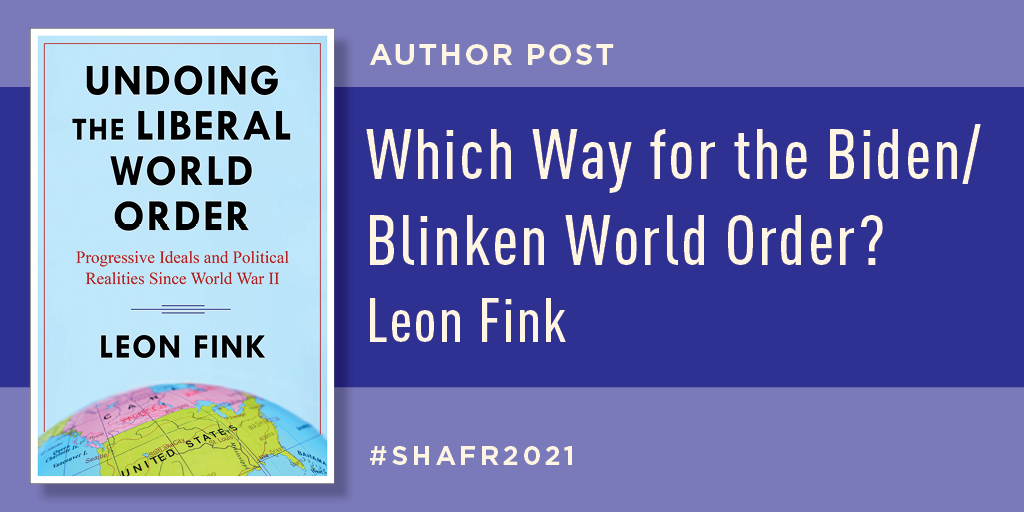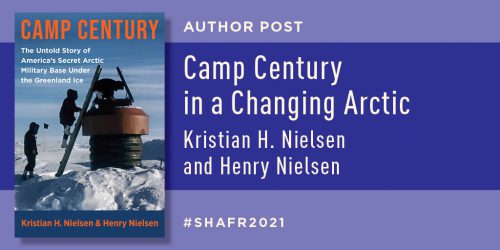Which Way for the Biden/Blinken World Liberal Order?
By Leon Fink

In the spring 2017, Antony Blinken, then a resident fellow at the University of Chicago’s Institute of Politics, taught a seminar on America’s role in the world. Against a background of growing doubt among many Americans about the advantages of remaining “open to the world,” the seminar promised to reassert the “importance of a U.S.-led global order that keeps people, products, ideas, and capital flowing with common rules, norms, and institutions.”
Blinken’s phrasing fairly summarizes a version of a “liberal world order” that has long been dominant in international relations circles, even through the Clinton and Obama administrations in which Blinken served. Invoking geopolitical commitments dating to the end of World War II, it is a vision that prioritizes the resolution of big-power security conflicts while generally defending a rule-based order operating through multilateral institutions and open markets.
Yet as I argue in my forthcoming Undoing the Liberal World Order: Progressive Ideals and Political Realities, focus on an “open” versus a “closed” world ignores another important strain in postwar liberal policy making. Today’s security focus—generally alike in both Republican and Democratic administrations and leavened only by spurts of “humanitarian” intervention in human disaster zones—is a significant departure from the preoccupations of liberals in the decades immediately after World War II. In contrast to today’s preoccupation with a system of liberal internationalism, the left-liberal actors I follow tried to move the world in a social-democratic direction in consonance with their domestic commitments and close cooperation with their chosen in-country allies.
Today’s security focus…is a significant departure from the preoccupations of liberals in the decades immediately after World War II.
These liberal voices sounded notes of confidence and ambition. Most visible in Germany, they transformed the world’s worst human rights offender into one of its most thriving and socially progressive nation-states. Similarly, befriending and protecting a fledgling Israeli democracy, they also imagined a distinct national sovereignty for Palestinians.
True, such liberal designs were not always realized. They often encountered powerful oppositional currents and suffered from their own naïveté and internal contradictions. Democratic state building and economic development—both carried out in the midst of a competitive, sometimes deadly conflict with international communism—proved to be more difficult than liberals imagined. Roosevelt’s Good Neighbor policy in Latin America, for example, erased some of the sting of previous American neocolonialism, but fear of communism soon converted much of official U.S. policy—with the singular exception of Costa Rica—into fierce opposition to cries for revolutionary change throughout the region.
Elsewhere in the world, liberal development projects brought decidedly mixed results. Regarding Africa and Asia, liberal policy makers generally welcomed the explosion of new, decolonized states and identified with popular demands for democratic self-government and economic growth. But there too, political realities intervened. Despite generally good relations with Prime Minister Nehru and an ambitious vision of community development, three prominent liberal ambassadors to India—Chester A. Bowles, John Kenneth Galbraith, and Daniel Patrick Moynihan—all failed to advance key indices of poverty and social welfare.
Perhaps the most successful example of a liberal-cum-human-rights approach to foreign policy was reflected in the anti-apartheid movement…
Yet even as the Vietnam War cast doubt on American aims and capacity for progressive intervention, there were still moments that stoked the fires of a deep-seated liberal idealism. Perhaps the most successful example of a liberal-cum-human-rights approach to foreign policy was reflected in the anti-apartheid movement, when both liberals and radical social activists pressured Congress to impose stringent economic sanctions on South Africa in 1986, helping free Nelson Mandela from prison and opening a path to a racially integrated democracy.
Whatever their deficiencies and limitations, I argue that the efforts of this earlier postwar era expressed a determination to transform the world, and often in self-evidently left-liberal or social-democratic ways. By comparison, the underlying foreign policy challenges of the current era of “globalization”—whether economic insecurity, climate change, or infectious diseases—have largely eluded translation into effective political mobilization. Immigration, the balance of trade, and the even the cost of living increasingly elude national solutions, but how to resolve them within the current world order?
By identifying postwar liberalism with a more pointedly progressive developmental vision, I am intentionally raising the stakes of judgment about the application of the label “liberal world order.” Neither an outright celebration nor a blanket condemnation of U.S. postwar policy, my study defines a swath of historical experience outside the better-known contours of U.S. imperial dominance, a territory of multiple possibilities. When not deflected by military operations or overrun by profit-seeking business interests, American liberals took steps abroad in pursuit of an expansive vision of social and industrial democracy. Might President Biden’s and Secretary of State Blinken’s recent, repeated rhetorical emphasis on an alliance of democracies be a sign that they may intend to recover the better side of the liberal tradition? Their support of the G-7 finance ministers’ call for a global minimum tax on corporations is a promising first step. Yet it will take far more if the United States truly aims to contribute to a meaningful liberal world order.
Leon Fink is distinguished professor of history emeritus at the University of Illinois at Chicago and senior resident scholar at Georgetown University’s Kalmanovitz Initiative for Labor and the Working Poor. He is the author of Undoing the Liberal World Order: Progressive Ideals and Political Realities Since World War II.
You can use the code SHAFR at checkout from our website for a 20 percent discount on this book or any of our conference titles through July 31, 2021.




